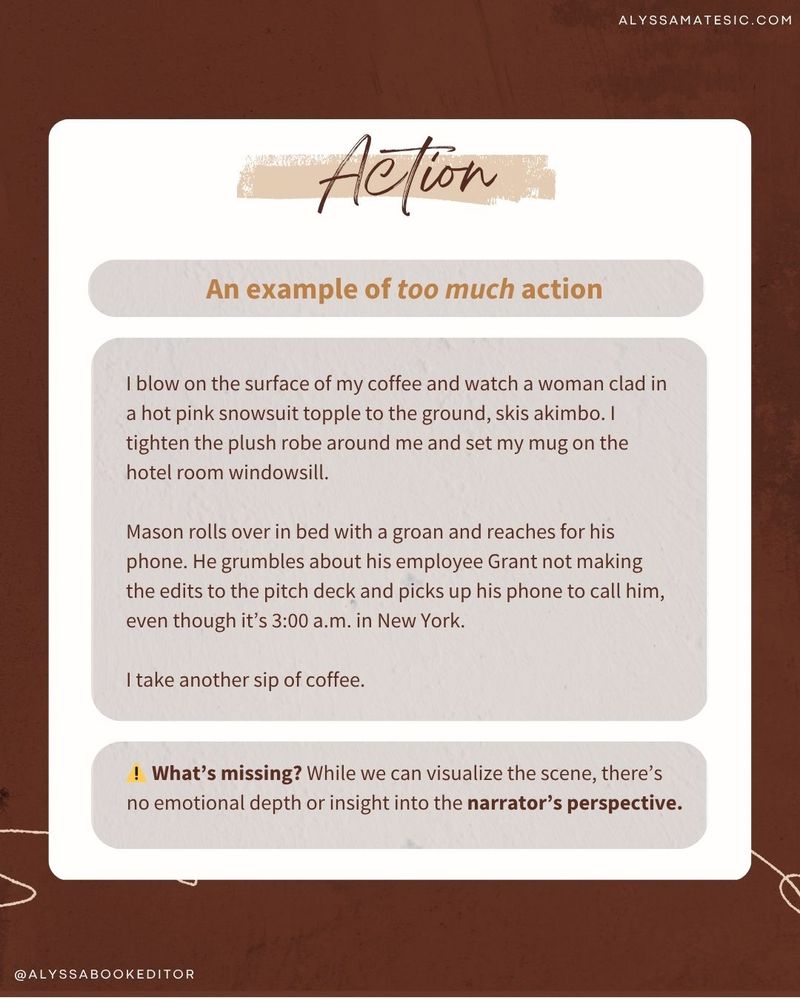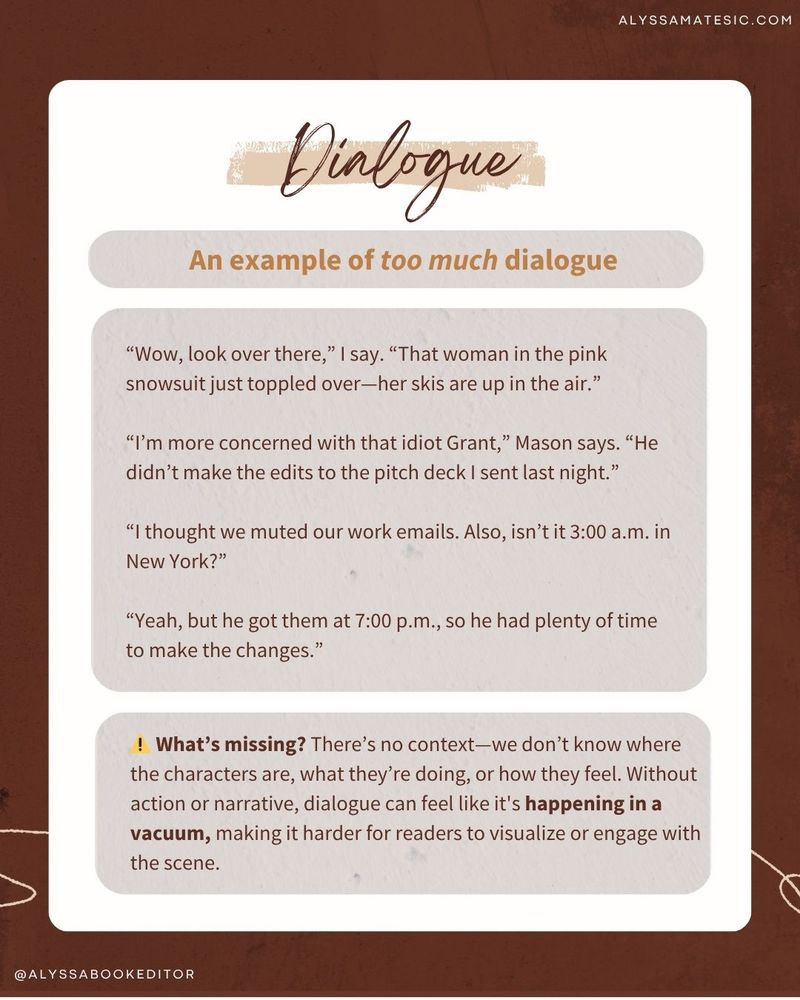formerly at Penguin Random House and The Book Group
🎥 weekly tips on YouTube! https://www.youtube.com/@AlyssaMatesic
💌 insider publishing tips: https://www.chapter-break.com
✏️work with me: https://www.alyssamatesic.com
⭐ An incredible growing community of writers across my YouTube channel and newsletter
⭐ Co-authoring my first book
⭐ Celebrating client successes




⭐ An incredible growing community of writers across my YouTube channel and newsletter
⭐ Co-authoring my first book
⭐ Celebrating client successes
Come tell me about your book and learn from all the incredible presenters (seriously, the lineup is insane) in a beautiful setting. I can't wait!
Sign up here: tinyurl.com/smwconference

Come tell me about your book and learn from all the incredible presenters (seriously, the lineup is insane) in a beautiful setting. I can't wait!
Sign up here: tinyurl.com/smwconference
They all started as messy, imperfect, likely chaotic first drafts.
So if you're staring at your manuscript, fretting that it isn't where you want it to be yet: don't worry. You aren't doing anything wrong.
They all started as messy, imperfect, likely chaotic first drafts.
So if you're staring at your manuscript, fretting that it isn't where you want it to be yet: don't worry. You aren't doing anything wrong.




- Exploring other books and media
- Taking a restorative break to clear your head
- Eliminating the pressures on yourself
- Exploring other books and media
- Taking a restorative break to clear your head
- Eliminating the pressures on yourself
This leaves a short few weeks to complete your novel this year. Here's how to get over the finish line:
This leaves a short few weeks to complete your novel this year. Here's how to get over the finish line:
So which plot does your story follow...
Comedy 🤣
Rebirth 🐣
Quest? 💼
To find out, watch today's video where I rank the 7 basic plots from worst to best!
youtu.be/Kww_Gj_QleA

So which plot does your story follow...
Comedy 🤣
Rebirth 🐣
Quest? 💼
To find out, watch today's video where I rank the 7 basic plots from worst to best!
youtu.be/Kww_Gj_QleA
But how can you tell if you have enough conflict in your story?
Here are three keys to writing effective conflict that keeps readers turning the pages:
But how can you tell if you have enough conflict in your story?
Here are three keys to writing effective conflict that keeps readers turning the pages:
Here are my top 10 tips for authors just starting out. (The stuff that often takes years to learn!)
youtu.be/Tu3J4QkbZ7I

Here are my top 10 tips for authors just starting out. (The stuff that often takes years to learn!)
youtu.be/Tu3J4QkbZ7I
But I can promise you that no writer has it all figured out.
But I can promise you that no writer has it all figured out.
❌ Writing only happens at the keyboard
❌ You have to write every day
❌ "Thinking" about your story doesn't count
They simply aren't true. Take a look at how three published authors stay connected to their stories, even when they’re not actively drafting.



❌ Writing only happens at the keyboard
❌ You have to write every day
❌ "Thinking" about your story doesn't count
They simply aren't true. Take a look at how three published authors stay connected to their stories, even when they’re not actively drafting.
Regardless of where you're at in your journey, you're part of a small group of people who did not take the easy way out.
Regardless of where you're at in your journey, you're part of a small group of people who did not take the easy way out.
But they’re not. I promise.
Rejections don’t mean you don’t have talent; they just mean your book wasn’t right for those particular agents at those particular moments.
But they’re not. I promise.
Rejections don’t mean you don’t have talent; they just mean your book wasn’t right for those particular agents at those particular moments.
It contains:
📝 the 7 elements your letter should include
📝 guidance on personalizing
📝 length guidelines
📝 tone & formatting
📝 common mistakes
Still have questions? Leave me a comment ⬇️




It contains:
📝 the 7 elements your letter should include
📝 guidance on personalizing
📝 length guidelines
📝 tone & formatting
📝 common mistakes
Still have questions? Leave me a comment ⬇️
I'm workshopping things like:
✏️ creating narrative momentum
✏️ fixing head hopping
✏️ whether to include a prologue
youtu.be/U3rkFrO2gso

I'm workshopping things like:
✏️ creating narrative momentum
✏️ fixing head hopping
✏️ whether to include a prologue
youtu.be/U3rkFrO2gso
🏃 ACTION
🗣️ DIALOGUE
💬 NARRATIVE
Most writers naturally lean on one and may neglect the others, leading to scenes that feel imbalanced or emotionally weak.
So here's how to use each element effectively, plus examples demonstrating the common pitfalls!




🏃 ACTION
🗣️ DIALOGUE
💬 NARRATIVE
Most writers naturally lean on one and may neglect the others, leading to scenes that feel imbalanced or emotionally weak.
So here's how to use each element effectively, plus examples demonstrating the common pitfalls!
It all comes down to a psychological phenomenon known as the Zeigarnik effect. 🧠
It all comes down to a psychological phenomenon known as the Zeigarnik effect. 🧠
Then, check your story against these issues:
❌ head hopping
❌ not going deep enough
❌ including too many POVs
❌ ignoring genre conventions
Watch my full breakdown!
youtu.be/NJGAYA7FgpM

Then, check your story against these issues:
❌ head hopping
❌ not going deep enough
❌ including too many POVs
❌ ignoring genre conventions
Watch my full breakdown!
youtu.be/NJGAYA7FgpM
Right?
Not quite. The reality of publishing is that there are always going to be moving goalposts. The next milestone to hit. The next target to reach. 🎯
Right?
Not quite. The reality of publishing is that there are always going to be moving goalposts. The next milestone to hit. The next target to reach. 🎯
-you get ghosted 😔
-you have to put yourself out there 👀
-it's worth waiting for the right match 💞

-you get ghosted 😔
-you have to put yourself out there 👀
-it's worth waiting for the right match 💞
Here are 20 strategies to help you get unstuck.
What’s your favorite trick for beating writer’s block?




Here are 20 strategies to help you get unstuck.
What’s your favorite trick for beating writer’s block?
THE MODERN GUIDE TO QUERYING LITERARY AGENTS is coming to you summer 2026! 👀

THE MODERN GUIDE TO QUERYING LITERARY AGENTS is coming to you summer 2026! 👀
❌ writer's block
❌ writing a blurb
❌ rejections?
Writing a freaking synopsis.
Why do so many agents ask for one anyway? What's the point?
❌ writer's block
❌ writing a blurb
❌ rejections?
Writing a freaking synopsis.
Why do so many agents ask for one anyway? What's the point?
The answer comes down to a powerful but little-known psychological principle known as the Zeigarnik effect.
Here's how to use this psychological principle to make your book "unputdownable."
youtu.be/6p4_JKpshoc

The answer comes down to a powerful but little-known psychological principle known as the Zeigarnik effect.
Here's how to use this psychological principle to make your book "unputdownable."
youtu.be/6p4_JKpshoc

